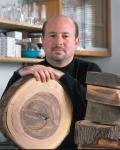
Climate scientist Michael Mann's private e-mails and research notes will remain private, thanks to a ruling by the Virginia Supreme Court. "Virginia's highest court has ruled that Attorney General Ken Cuccinelli cannot compel the University of Virginia to turn over records dealing with the work of a former university climate scientist," reports the Roanoke Times (March 2, 2012). The Guardian (March 2, 2012) explains, "The court rejected Ken Cuccinelli's demand for Mann's email, research notes, and even handwritten memos from his time at the University of Virginia, ruling that the official did not have the legal authority to demand such records."
Mann, who departed the University of Virginia for Penn State University in 2005, expressed his pleasure at the ruling, telling the Richmond News Leader (March 2, 2012), "I'm pleased that this particular episode is over." He added, "It's sad, though, that so much money and resources had to be wasted on Cuccinelli's witch hunt against me and the University of Virginia, when it could have been invested, for example, in measures to protect Virginia's coast line from the damaging effects of sea level rise it is already seeing."
Mann rose to scientific prominence as well as a degree of popular fame thanks to his reconstruction of global temperature over the last thousand years, based on ice cores, lake sediment cores, and tree ring data as well as instrumental records. But his research drew fire from climate change deniers, who, as the Guardian explains, "accuse him of manipulating data. Such accusations multiplied after emails to and from Mann were made public as part of a batch released without authorisation from the University of East Anglia's climate research unit. Mann was cleared of wrongdoing by several investigations."
The suit began two years ago, only months after Cuccinelli took office. Cuccinelli, described by the Richmond News Leader as "a global warming skeptic," claimed that a state law related to taxpayer fraud gave the state a right to review private e-mails stored on university servers. Mann resisted the request for documents, citing academic freedom. The University of Virginia joined Mann's resistance, "arguing that the demand exceeded Cuccinelli's authority under state law and intruded on the rights of professors to pursue academic inquiry free from political pressure," according to the Washington Post (March 2, 2012).
The state supreme court voided Cuccinelli's request on narrow terms, ruling that the university is not covered by the law in question. Cuccinelli decried the court's decision, insisting, "From the beginning, we have said that we were simply trying to review documents that are unquestionably state property to determine whether or not fraud had been committed." In August 2010, a lower court judge concluded (PDF), "What the Attorney General suspects Mr. Mann did that was false or fraudulent ... is simply not stated," a conclusion affirmed in a concurrence to the Supreme Court ruling.
Mann's allies in the fight celebrated the ruling. Kent Willis of the ACLU of Virginia told the News Leader, "If academic freedom means anything, it is that scientists and other scholars should be able to communicate freely without fear that the government is looking over their shoulders." The ACLU of Virginia filed (PDF) an amicus brief supporting Mann, joined by the American Association of University Professors, the Thomas Jefferson Center for the Protection of Free Expression, and the Union of Concerned Scientists (UCS). The UCS also provides a timeline of the lawsuit and links to original documents on its website.
